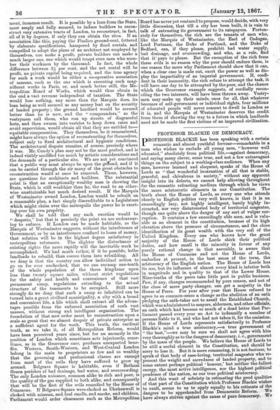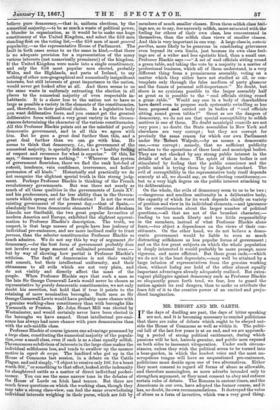PROFESSOR BLACKTE ON DEMOCRACY.
PROFESSOR BLACKIE has been speaking with a certain romantic and almost youthful fervour—remarkable in a man who wishes to exclude all young men, "however well educated," absolutely from political life,—against democracy, and saying many clever, some true, and not a few extravagant things on the subject to a working-class audience. When any man, however learned and eloquent, speaks of the House of Lords as "that wonderful incarnation of all that is stable, graceful, and chivalrous in society," without any apparent insight into its defects, we cannot help allowing throughout for the romantic refracting medium through which he views the more aristocratic elements in our Constitution. The truth about the House of Lords, as every one who attends closely to English politics very well knows, is that it is an exceedingly lazy, not highly intelligent, barely highly in- structed, nor very disinterested body of territorial magnates, though one quite above the danger of any sort of vulgar cor- ruption. It contains a few exceedingly able men, and is valu- able as an element in the constitution, because of its high elevation above the pressure of circumstances, and the close identification of its great wealth with the very soil of the United Kingdom. Every one who knows how the great majority of the House of Lords shirk their political duties, and how small is the minority in favour of any purely rational change in that assembly, is aware that the House of Commons and not the House of Lords, embodies at present, in the best sense of the term, the aristocracy of the English nation. The House of Lords has its use, but its influence of almost every kind is inferior both in magnitude and in quality to that of the Lower House. Nine-tenths of the peers take little part in public business. Few, if any, changes recommended by pure reason, and not of the class of mere party changes, can get a majority in the House of Peers. For year after year that House refused to agree to so common-sense a change as the abolition of an oath pledging the oath-taker not to assail the Established Church, which was administered to mayors, aldermen, and other officials, an oath which had become so much of a dead letter that Par- liament passed every year an Act to indemnify a number of persons liable to it, and who had not taken it, for the omission. If the House of Lords represents satisfactorily to Professor Blackie's mind a true aristocracy,—a true government of "the best,"—we may be sure we shall not agree with him very thoroughly as to the dangers of democracy, i. e., government by the mass of the people. We believe the House of Lords to be still a useful element in the Constitution, and should be sorry to lose it. But it is mere romancing, it is not business, to speak of that body of ease-loving, territorial magnates who re- present the weight and sacredness of landed property, and to some extent perhaps political honour,' but neither the fullest energy, the most active intelligence, nor the highest political prudence of the nation, as our true political aristocracy. And this want of sobriety in estimating the good qualities of that part of the Constitution which Professor Blackie wishes to exalt, seems to us to apply equally to his estimate of the dangers to be apprehended from Democratic Reform. We have always striven against the cause of pure democracy. We believe pure democracy,—that is, uniform elections, by the numerical majority,—to be as much a waste of political power, a blunder in organization, as it would be to make one huge constituency of the United Kingdom, and select the 658 men standing first on the voting list,—the 658 men of most general popularity,—as the representative House of Parliament. The fault in both cases seems to us the same in kind,—that there is no adequate provision for a representation of the many various interests (not numerically prominent) of the kingdom. If the United Kingdom were made into a single constituency, and only the 658 most popular men elected, probably Wales, and the Highlands, and parts of Ireland, to say nothing of other non-geographical and numerically insignificant interests, but still interests of great importance to the nation, would never get looked after at all. And there seems to us the same waste in uniformly entrusting the election in all places to the numerical majority of even respectable hie habitants. It is a sheer loss to the nation not to have as large as possible a variety in the elements of the constituencies, and, therefore, in their political choice. In a legislative body you want deliberative force, and you cannot get the greatest deliberative force without a very great variety in the circum- stances determining the character of the various constituencies. All this Professor Blackie points out as the mischief of purely democratic government, and in all this we agree with him. But he goes a great deal further than this, and a great deal further than we can go with him. He seems to think that democracy, i.e., the government of the numerical majority, is specially deficient in a "healthy feeling of respect and reverence for what is superior." Of this, he says, "democracy knows nothing." "Wherever that system of government flourishes, there we find the rank hot-bed of conceit, insolence, vain confidence, irreverence, and hollow pretension of all kinds." • Historically and practically we do not recognize the slightest special truth in this strong judg- ment. Perhaps Professor Blackie is thinking of the French revolutionary governments. But was there not nearly as much of all these qualities in the governments 'ofLouis XV. and his predecessors, and far less ability than in the Govern- ments which sprang out of the Revolution ? Is not the worst existing government of the present day,—that of Spain,— absolutely free from democratic elements ? Neither Abraham Lincoln nor Garibaldi, the two great popular favourites of modern America and Europe, exhibited the slightest approxi- mation to Professor Blackie's description. The truth, we suspect, is that large masses of people have less jealousy of individual pre-eminence, and are more inclined really to trust persons, than the selecter constituencies Professor Blackie so much admires. We do not say this by way of argument for democracy,—for the best form of government probably does not involve any large amount of unlimited personal trust,— but by way of showing how partial is Professor Blackie's criticism. The fault of democracies is not their vanity and conceit; but their intellectual uniformity, and their obtuseness to all evils which are not very plain, and do not visibly and directly affect the mass of the people. When Professor Blackie says that such a man as the late Sir George Cornewall Lewis would never be chosen as representative by purely democratic constituencies, we not only doubt his assertion, but hold that if true it points to the retaining of mere nomination boroughs. Such men as Sir George Cornewall Lewis would have probably more chance with a genuine working-class constituency than with boroughs like Yarmouth or Preston. yr. John Stuart Mill was elected by Westminster, and would certainly never have been elected in the boroughs we have named. Great intellectual pre-emi- nence has always had more chance with pure democracies than with the sub-middle class.
Professor Blackie of course ignores one advantage possessed by a large class, constituting the numerical majority of the popula- tion, over a small class, even if each is as a class equally selfish. The enormous subdivison of interests in the large class makes the individual selfishness less, and tends to swallow up the meaner motive in esprit de corps. The landlord who got up in the House of Commons last session, in a debate on the Cattle Plague, and said simply, "I object to receive only 10/. for a beast worth 301.," or something to that effect, looked atthe indemnity for slaughtered cattle as a matter of direct individual pocket- money. You can see the same narrow tone in the debates of the House of Lords on Irish land tenure. But there are much fewer questions on which the working class, though they may take a strong class-view, can feel the same overwhelming individual interests weighing in their purse, which are felt by members of much smaller classes. Even these selfish class feel- ings are, so to say, less narrowly selfish, more saturated with the feeling for others of their own class, less concentrated in themselves, than the selfish class views of smaller classes.. And this is very important in one way. A large class is, cceteris paribus, more likely to be generous in considering grievances even beyond its own limits, just because its own class feel- ings are of a wider and less egotistic kind, than a small one. Professor Blackie says :—" A set of cool officials sitting round a green table, and taking the vote by a majority in a matter of professional business, which all of them understand, is a very different thing from a promiscuous assembly, voting on a matter which they either have not studied at all, or con- template only through the false medium of party glamour and the fumes of personal self-importance." No doubt, but is no cynicism possible to the larger assembly half as great as is possible to the "cool officials sitting round a green -table." Would any one in a body of -shareholders have dared even to propose such systematic swindling as has- been proposed and carried out in bodies of "cool officials sitting round green tables ?" Great as are the dangers of democracy, we do not see that special susceptibility to selfish motives is one of them. No doubt municipal councils are not very pure ; no doubt the State assemblies in New York and elsewhere are very corrupt ; but they are corrupt for• precisely the same reason for which our own Parliament under Sir 'Robert Walpole,—by no means a democratic one,—was corrupt ; namely, that no sufficient publicity attaches to the operations of these local and municipal bodies. They are not checked by any strong public interest in the details of what is done. The spirit of these bodies is not stimulated by feeling that the public conscience and the public mind is trying them by its highest standard. The evil of corruptibility in the representative body itself depends scarcely at all, we should say, on the electing constituency,— but to a very high degree on the public interest attaching to its deliberations.
On the whole, the evils of democracy seem to us to be two ; —dangerous and needless uniformity in a deliberative body, the capacity of which for its work depends chiefly on variety of position and view in its individual elements,—and ignorance- in the constituencies about the larger number of politicaF questions,—all that are not of the broadest character,— leading to too much liberty and too little responsibility in the members, instead of what Professor Blackie alone fears,—too abject a dependence on the views of their con- stituents. On the other hand, we do not believe a demo- cratic government would be liable to even so much distracting selfishness as less popular forms of government ; and on the few great subjects on which the whole population is deeply interested it would probably be more prompt, more vigorous, and more efficient. But these great ends,—which we do not in the least depreciate,—may well be attained by a large infusion of representatives from the genuine working class, without losing our hold of the other almost equally important advantages already adequately realized. But extra- vagant philippics against democracy such as Professor Blackie so eloquently pours forth tend, we fear, less to guard the nation against its real dangers, than to make us attribute the fears felt of it to the creative power of an excited and preju- diced imagination.































 Previous page
Previous page